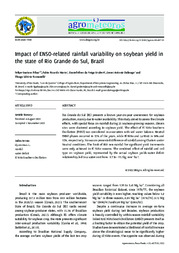Impact of ENSO-related rainfall variability on soybean yield in the state of Rio Grande do Sul, Brazil.
Impact of ENSO-related rainfall variability on soybean yield in the state of Rio Grande do Sul, Brazil.
Author(s): PILAU, F. G.; MARIN, F. R.; GRUBERT, D. A. da V.; DALMAGO, G. A.; ROMANELLI, T. L.
Summary: Abstract: Rio Grande do Sul (RS) presents a known year-on-year unevenness for soybean production, mainly due to water availability. This study aimed to assess the climate effects, with special focus on rainfall during 25 soybean-growing seasons. Eleven sites were clustered according to soybean yield. The effect of El Niño Southern Oscillation (ENSO) was considered in association with soil water balance. Neutral ENSO phases occurred in 32% of the years, while El Niño and La Ninã in 36% and 32%, respectively. No season presented difference of rainfall among Clusters under Neutral conditions. The limit of 800 mm rainfall for significant yield increments were only achieved in El Niño seasons. The combined effect of rainfall and soil type on soybean yield, represented by the actual soybean yields-water deficit relationship, led to a water cost from -3.7 to -15.2 kg mm-1 ha-1.
Publication year: 2022
Types of publication: Journal article
Unit: Embrapa Wheat
Observation
Some of Embrapa's publications are published as ePub files. To read them, use or download one of the following free software options to your computer or mobile device. Android: Google Play Books; IOS: iBooks; Windows and Linux: Calibre.
Access other publications
Access the Agricultural Research Database (BDPA) to consult Embrapa's full library collection and records.
Visit Embrapa Bookstore to purchase books and other publications sold by Embrapa.

